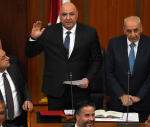You are here
Inter-generational fairness: Delivering opportunity to the next generation
Dec 02,2017 - Last updated at Dec 02,2017
I read an article a couple of weeks ago in the Financial Times entitled “Uncertain Prospects for Young Evoke Nostalgia for Welfare State in Wigan”. You would think from reading the headline that what is happening in a small largely non-descript suburban town in the UK has nothing to do with us here in crises-driven Jordan plunked in the middle of a turbulent Middle East.
I certainly only read it because I remembered I had a friend who got married and moved to Wigan some 20 years ago. It is a tenuous point of interest, but I pursued it only to find myself on a cascading route of discovery over what governments are willing to do or undertake in order to provide opportunity for the youth — or at least appear to be doing so if only to win political points or improve their popularity/confidence rates.
The main point the article posited was that more people were shifting towards the Labour Party and away from the Conservatives because they were feeling that Labour understood the concerns of the new generation and was focusing on what they called “elevators of social and economic progress providing opportunities and improving prospects for the next generation of youth”. A mouthful, I agree, but just consider the wealth of political framing and action possible within this one sentence.
Anyway, according to the article, the shift towards Labour in the June elections was not necessarily a result of the popularity of the Labour Party leader, Jeremy Corbyn, but a swing by the youth towards the left and in support of the return of welfare state mentality and provisions “an economic approach that delivered for a generation”. The article estimated that it was Corbyn’s promise to scrap tuition fees in the pre-elections period that incentivised “those under 30 to vote Labour by nearly two to one”.
Interestingly, the article expected the older generation — parents and grandparents — to join the youth in making that shift away from Conservatives because they apparently suffer from “generational guilt” and a deep sense of concern about “inter-generational fairness”. They wanted to see their government provide their children and therefore the next generation with opportunity and hope.
A couple of days after I read the article, I watched the UK budget speech presented by the Conservative government’s Chancellor of the Exchequer Phillip Hammond. While he broke the worrying news about expectations of a low growth rate for the UK economy — under 2 per cent for nearly five years - he picked up on this inter-generational fairness as a political gain entry point for his party and announced government exemptions for first-time buyers on stamp duty on the purchase of property up to GBP 300,000 and the first GBP 300,000 on GBP 500,000 in the more expensive capital London.
Media outlets and social media groups reflecting on the budget absolutely lamented the predictions of low growth rates and whether this is not the starkest sign yet of the impact of Brexit on the UK economy, whether proposed budget spending on the NHS was enough or not, but primarily and without doubt the conversation was focused on the capital gains exemptions and what it meant to first time buyers and the housing market in the UK as a whole.
Which begs the question: when our government in Jordan was presenting the budget to Parliament seeking their ratification only days later, did it consider at all also providing a window of hope for our youth — and their parents — that articulates the government’s understanding and compassion for this group’s “sense of grievance about their reduced prospects”?
A recent study of Jordan’s Youth — as part of a regional quantitative survey of eight regional countries and Syrian refugees in Lebanon conducted by Friedrich Ebert Stiftung and its local research partners — found that 27 per cent of Jordanian youth confirm that they are emigrating and another 16 per cent confirm that they want to emigrate. A staggering 43 per cent of all youth in the country are either on their way out or looking for a way out.
Did the government take note of these numbers and seek to address the youth in that budget? Did it take note that it needs to take steps to reverse youth flight from Jordan?
The simple answer is: No it did not. Not only did it fail to showcase compassion, it also showed what I believe is political and communication immaturity or at best carelessness.
I have read and reread the budget as presented by Finance Minister Omar Malhas — from my perspective as a layman and citizen — and it is clearly deficient if it is to be seen as the most important annual political statement to be made by a government in office. At the risk of boring you with my comparison, Hammond cracked jokes, poked fun at the opposition’s economic programmes, and cleverly undermined criticism before it was even lashed at him; he presented the budget as a politician would.
I do not expect a government — in order to be realistic — that was not elected nor is a product of a mature political party system, to be as politically savvy as that of a mature political system as that of the UK, but certainly it could have at least tried to reach out to Jordanians with measures that they can relate to in their daily lives and which can give them something positive to counter the package of negatives.
Jordanians understand, and many in fact support, most of the government’s package of austerity measures aimed at halting the bleeding in our deficit, including lifting subsidies and the shift towards a self-reliance agenda.
Jordanians will also take note that the social safety network has been expanded, that the education sector has had a large injection of financial and logistical support, that the decentralisation process and associated community development budgets have the interest of the Ministries of Finance and Planning, and that the business sector is going to be fortified with legislative reforms to support investment.
But even these steps are not nearly enough.
We need our government to inspire confidence, provide hope and showcase real prospects with political acumen and commitment as well as a sense of responsibility to the citizens — in all their population categories — and not continue to function simply as the operations manager of the state’s institutions.













